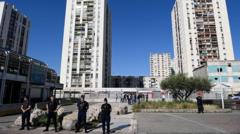It was only a matter of time before Muhammed Asif Hafeez's dual existence as a celebrated polo ambassador and a prolific drug lord culminated in justice. His ultimate downfall came through an elaborate sting operation, revealing the stark contrasts of his life dedicated to crime despite outward appearances of luxury and nobility.
The Rise and Fall of a Polo-Dancing Drug Kingpin

The Rise and Fall of a Polo-Dancing Drug Kingpin
Muhammed Asif Hafeez, the affluent polo lover turned notorious drug trafficker, led a double life that eventually led to his conviction and lengthy prison sentence.
Muhammed Asif Hafeez, a man who epitomized duality, infamously traversed the worlds of elite polo clubs and organized crime. Lauded as an influential businessman and ambassador for London's esteemed Ham Polo Club, Hafeez mingled with high-profile figures, including members of the British royal family. Presenting himself as a concerned civic-minded individual, he even shared intelligence with law enforcement agencies to expose drug trafficking rivals. Yet, unbeknownst to many, Hafeez was subsequently labeled by U.S. authorities as "one of the world’s most prolific drug traffickers," orchestrating a vast empire from his base in the UK.
A complex investigation led by British and American agencies ultimately revealed the stark contrast between Hafeez's public persona and his criminal activities. While supplying significant quantities of heroin, methamphetamine, and hashish internationally, Hafeez branded himself an informant to eliminate competition. Notably, he had earned the title "the Sultan" within the underworld due to his significant influence.
Hafeez, 66, was extradited to the U.S. from London earlier this year, where he later pleaded guilty to conspiracy charges involving massive drug imports intended for the American market. Last Friday, he received a 16-year prison sentence in New York, capping an intense journey of calculated deception and lavish lifestyles. Having been held in custody since 2017, he is scheduled for release in 2033.
Born in Lahore, Pakistan, Hafeez experienced a comfortable upbringing, which eventually led him to establish an umbrella company that appeared legitimate yet might have concealed illicit operations. Despite an outwardly legitimate front, employees noted their suspicions, discovering payments were often made in cash with virtually no records of transactions.
His long-standing illicit activities were further scrutinized after an undercover operation revealed his ties to international drug cartels. A vital turning point occurred during a 2014 meeting in Kenya, where associates of Hafeez unwittingly engaged with a DEA informant, putting law enforcement on his trail. Further investigations linked him unmistakably to various drug trafficking cases, consolidating evidence against him.
Ultimately, Hafeez's legal battles against extradition in the UK proved futile. Courts dismissed his claims of being an informant deserving protection, acknowledging his actions were self-serving rather than altruistic. As law enforcement gathered mounting evidence, including communications between his associates, Hafeez was arrested in London in 2017.
Following his extradition, Hafeez pled guilty to drug conspiracy, emphasizing a glaring divide between his privileged lifestyle and the destruction wrought by drug trafficking. U.S. prosecutors highlighted how Hafeez's decisions reflected his chosen path amid his opportunities, contrasting sharply with many who turn to crime out of desperation. As he serves his prison sentence, the story of Muhammed Asif Hafeez encapsulates the duality of glamour and crime, ultimately yielding to the enforcement of justice.



















